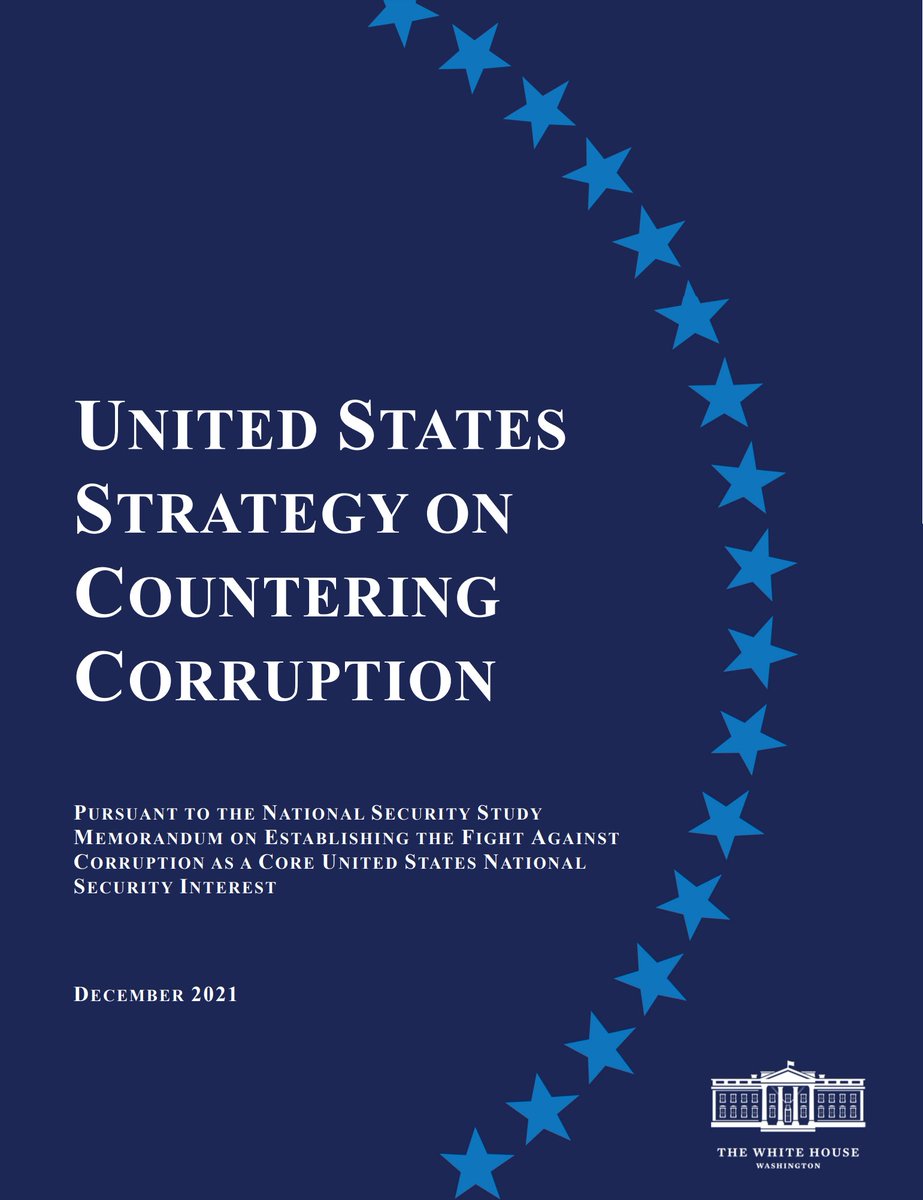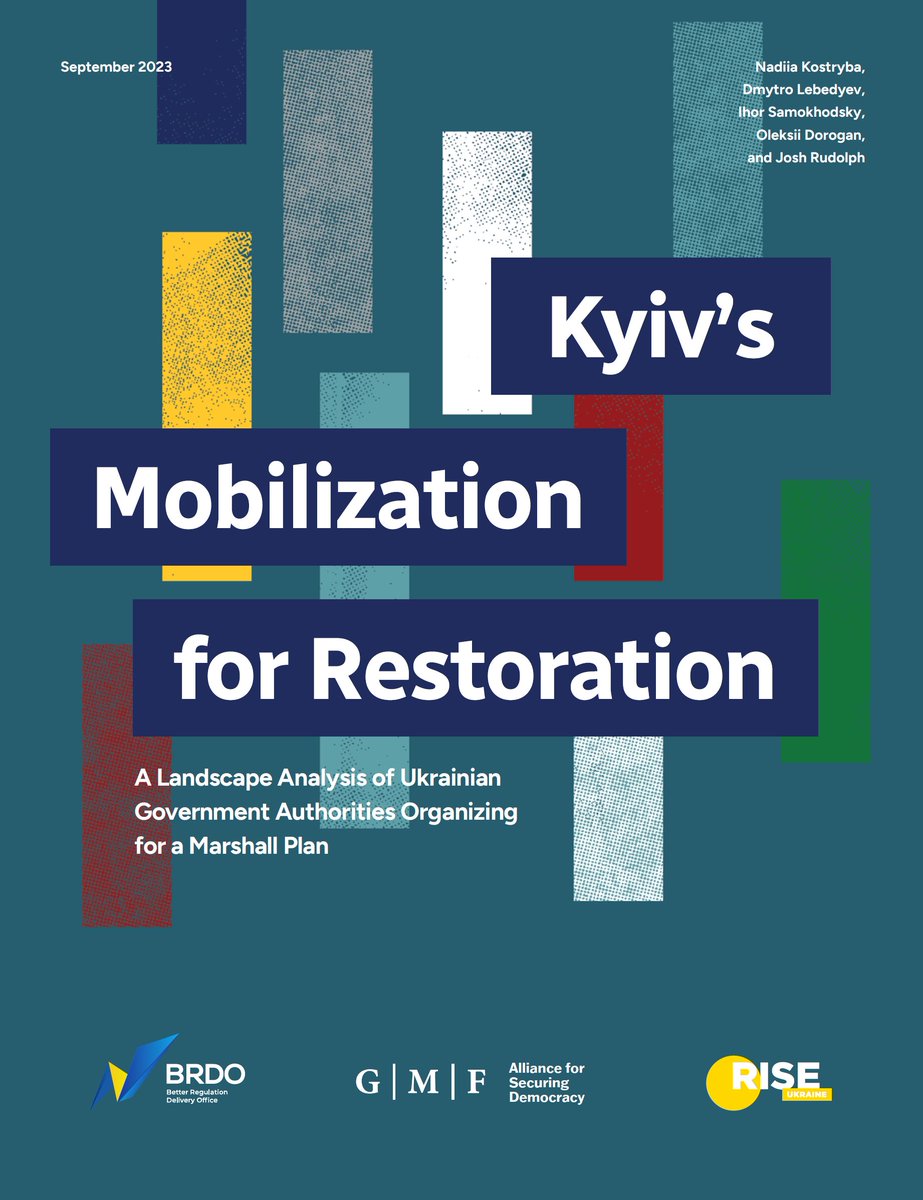BOOM—@WhiteHouse publishes the first-ever US government strategy on countering corruption!
It's two weeks ahead of Biden's 200-day deadline, impressively broad in scope, and powerfully strong in details, setting a fierce tone for the #SummitforDemocracy! whitehouse.gov/briefing-room/…
It's two weeks ahead of Biden's 200-day deadline, impressively broad in scope, and powerfully strong in details, setting a fierce tone for the #SummitforDemocracy! whitehouse.gov/briefing-room/…

It's esp. focused on the transnational dimensions and ability to launder the proceeds of corruption (pillar 2⃣ is the most important), but it's a whole-of-government strategy with five pillars:
1⃣ US government
2⃣ Illicit finance
3⃣ Accountability
4⃣ Multilateral
5⃣ Foreign aid
1⃣ US government
2⃣ Illicit finance
3⃣ Accountability
4⃣ Multilateral
5⃣ Foreign aid

1⃣ Elevating efforts across the US government
This puts @USTreasury, @StateDept, @CommerceGov, @USAID, @TheJusticeDept, and @ODNIgov on the hook to dedicate more resources and stand up coordinating bodies to raise their game on fighting transnational corruption.
This puts @USTreasury, @StateDept, @CommerceGov, @USAID, @TheJusticeDept, and @ODNIgov on the hook to dedicate more resources and stand up coordinating bodies to raise their game on fighting transnational corruption.

2⃣ Curbing illicit finance
This is the big one, folks. Beyond just the statutorily required regs on beneficial ownership, they're issuing new regs for real estate, re-examining AML rules for investment advisors, and working with Congress on legislation like the ENABLERS Act!
This is the big one, folks. Beyond just the statutorily required regs on beneficial ownership, they're issuing new regs for real estate, re-examining AML rules for investment advisors, and working with Congress on legislation like the ENABLERS Act!

Let's go through this one in detail, given it's the most powerful pillar.
On real estate, the appendix in the back says Treasury will issue regulations with reporting requirements for those with valuable info on real estate transactions. That's very impressive in its breadth!
On real estate, the appendix in the back says Treasury will issue regulations with reporting requirements for those with valuable info on real estate transactions. That's very impressive in its breadth!

Sure enough, this morning Treasury issued a notice of proposed rulemaking aiming to extend the ownership reporting obligations that title insurers currently face under GTOs to be permanent, nationwide, with no threshold, and include commercial real estate. fincen.gov/news/news-rele… 

Importantly though, Treasury's notice also invites comments on going further, either by including others (like lawyers, realtors, escrow agents, etc.) in the reporting requirement or by imposing full AML obligations (CDD, SARs, etc.) on them. We've been waiting 20 years for that! 







While it had been reported recently that Treasury was looking at real estate regs (although not nearly that broad), Treasury will also re-examine the 2015 draft rule for investment advisors and they're open to expanding it to cover private placement funds offered by the firms. 👍 

Announcing plans to do this was a key recommendation of my report on enablers: securingdemocracy.gmfus.org/regulating-the…
And it was recommended last week by @FACTCoalition, @IllicitFlows, and @transparencyUSA: thefactcoalition.org/report/private…
That re-examination should include six expansions. ⬇️
And it was recommended last week by @FACTCoalition, @IllicitFlows, and @transparencyUSA: thefactcoalition.org/report/private…
That re-examination should include six expansions. ⬇️

Beyond real estate and investment advisors, the administration wants to work with Congress to secure additional authorities covering lawyers, accountants, TCSPs, and others (left image).
In all but name, this is a Biden administration endorsement of the ENABLERS Act (right img)!

In all but name, this is a Biden administration endorsement of the ENABLERS Act (right img)!


And while those are the top news-making headlines in pillar 2⃣ on curbing illicit finance, there's more in there as well, including aggressive enforcement, offshore finance, digital assets, art and antiquities, and commitment to cover additional sectors.
3⃣ Accountability
The news headline here is that the admin. is launching a host of new programs at @USTreasury, @StateDept (working with partner democracies to fight safe haven!), & @USAID (global accountability program!) to hold crooks accountable, going well beyond sanctions!
The news headline here is that the admin. is launching a host of new programs at @USTreasury, @StateDept (working with partner democracies to fight safe haven!), & @USAID (global accountability program!) to hold crooks accountable, going well beyond sanctions!

4⃣ Multilateral architecture
The administration will redouble anti-corruption efforts across the range of multilateral fora, including the OECD, OAS, UNCAC, NATO, G20, G7, OGP, EITI, etc.
This gives US missions to these bodies important marching orders to prioritize corruption.
The administration will redouble anti-corruption efforts across the range of multilateral fora, including the OECD, OAS, UNCAC, NATO, G20, G7, OGP, EITI, etc.
This gives US missions to these bodies important marching orders to prioritize corruption.

5⃣ Diplomacy & foreign assistance
This pillar is last but not least, second in importance to illicit finance. Diplomats/embassies/aid will prioritize corruption. The US will reevaluate aid criteria, scale it up/down, etc. The last bullet is seemingly on Afghanistan among others.
This pillar is last but not least, second in importance to illicit finance. Diplomats/embassies/aid will prioritize corruption. The US will reevaluate aid criteria, scale it up/down, etc. The last bullet is seemingly on Afghanistan among others.

Oops, I attached the wrong image there. That one was about recommended GTO expansion priorities. I meant to attach this one about recommended expansions to the investment advisor rule proposed in 2015. ⬇️ 

In sum, the breadth of this @WhiteHouse strategy—especially with the details in the appendix and more announcements coming from the agencies all week (@USTreasury today, @USAID tomorrow, etc)—makes it the most sweeping anti-corruption policy initiative in American history. 👏👏👏
Actually, let’s give the last word to @SecYellen & @PowerUSAID, who are leading @USTreasury & @USAID to steal the show this week, using their policy levers and strong voices to kick off the Summit for Democracy w/ a bang and tee up a year of action. 👏👏👏 washingtonpost.com/opinions/2021/…
• • •
Missing some Tweet in this thread? You can try to
force a refresh


















